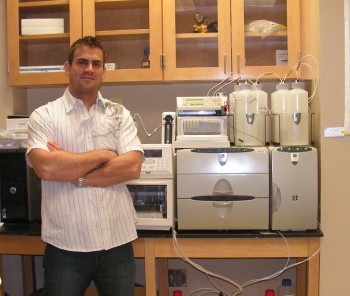CAZypedia needs your help! We have many unassigned GH, PL, CE, AA, GT, and CBM pages in need of Authors and Responsible Curators.
Scientists at all career stages, including students, are welcome to contribute to CAZypedia. Read more here, and in the 10th anniversary article in Glycobiology.
New to the CAZy classification? Read this first.
*
Consider attending the 15th Carbohydrate Bioengineering Meeting in Ghent, 5-8 May 2024.
Difference between revisions of "User:Wade Abbott"
Wade Abbott (talk | contribs) |
Harry Brumer (talk | contribs) |
||
| Line 1: | Line 1: | ||
| + | [[image:PICT1633.JPG|350 px|right]] | ||
Wade Abbott received his PhD under Juan Ausió at the University of Victoria (Canada) for investigating the role of histone variants in the modulation of nucleosome structure. His work contributed to our understanding of how changes to nucleosome composition by exchange of histone variants introduce tailored changes in nucleosome stability and chromatin fiber folding. Following his doctorate degree, he joined Dr. ^^^Alisdair Boraston^^^’s group (University of Victoria) for his first postdoc where he investigated protein-carbohydrate interactions and carbohydrate utilization by invasive bacterial pathogens. His research focused on the utilization of dietary complex carbohydrates (pectin) and host glycans in bacterial nutrition and dissemination. Currently, Dr. Abbott is located at the Complex Carbohydrate Research Center working under Prof. ^^^Harry Gilbert^^^. His research centers on the modification and deconstruction of complex carbohydrates within the distal small intestine of animals during digestion. This process is intimately associated with the actions of resident microbes, such as ''Bacteroides thetaiotaomicron'', microorganisms that contain an impressive arsenal of enzymes dedicated to carbohydrate metabolism. By characterizing how these enzymes work, these functions can then be placed within a biological context to help illumniate how the gut microbiota interacts with the host during the coordinated process of digestion and the maintenance of intestinal heath. | Wade Abbott received his PhD under Juan Ausió at the University of Victoria (Canada) for investigating the role of histone variants in the modulation of nucleosome structure. His work contributed to our understanding of how changes to nucleosome composition by exchange of histone variants introduce tailored changes in nucleosome stability and chromatin fiber folding. Following his doctorate degree, he joined Dr. ^^^Alisdair Boraston^^^’s group (University of Victoria) for his first postdoc where he investigated protein-carbohydrate interactions and carbohydrate utilization by invasive bacterial pathogens. His research focused on the utilization of dietary complex carbohydrates (pectin) and host glycans in bacterial nutrition and dissemination. Currently, Dr. Abbott is located at the Complex Carbohydrate Research Center working under Prof. ^^^Harry Gilbert^^^. His research centers on the modification and deconstruction of complex carbohydrates within the distal small intestine of animals during digestion. This process is intimately associated with the actions of resident microbes, such as ''Bacteroides thetaiotaomicron'', microorganisms that contain an impressive arsenal of enzymes dedicated to carbohydrate metabolism. By characterizing how these enzymes work, these functions can then be placed within a biological context to help illumniate how the gut microbiota interacts with the host during the coordinated process of digestion and the maintenance of intestinal heath. | ||
[[Category:Contributors|Abbott, Wade]] | [[Category:Contributors|Abbott, Wade]] | ||
| − | |||
Revision as of 00:57, 4 December 2009
Wade Abbott received his PhD under Juan Ausió at the University of Victoria (Canada) for investigating the role of histone variants in the modulation of nucleosome structure. His work contributed to our understanding of how changes to nucleosome composition by exchange of histone variants introduce tailored changes in nucleosome stability and chromatin fiber folding. Following his doctorate degree, he joined Dr. ^^^Alisdair Boraston^^^’s group (University of Victoria) for his first postdoc where he investigated protein-carbohydrate interactions and carbohydrate utilization by invasive bacterial pathogens. His research focused on the utilization of dietary complex carbohydrates (pectin) and host glycans in bacterial nutrition and dissemination. Currently, Dr. Abbott is located at the Complex Carbohydrate Research Center working under Prof. ^^^Harry Gilbert^^^. His research centers on the modification and deconstruction of complex carbohydrates within the distal small intestine of animals during digestion. This process is intimately associated with the actions of resident microbes, such as Bacteroides thetaiotaomicron, microorganisms that contain an impressive arsenal of enzymes dedicated to carbohydrate metabolism. By characterizing how these enzymes work, these functions can then be placed within a biological context to help illumniate how the gut microbiota interacts with the host during the coordinated process of digestion and the maintenance of intestinal heath.
